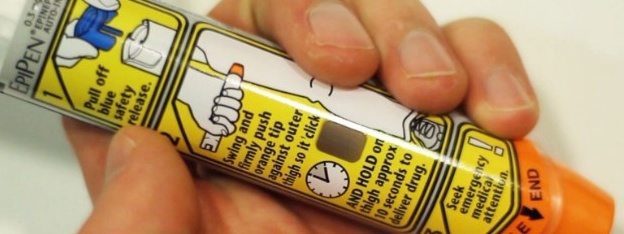Speech 9: Persuade with Power. The ninth speech of the Toastmasters Competent Communicator program is meant to help me get comfortable using various forms of persuasion to encourage an audience to take a certain action.
Earlier this year my mother and I took a girls’ trip to North Carolina. We were both looking forward to a little relaxation, but the vacation kicked off with sickening bang when I had to use my EpiPen for the first time…on a total stranger.
We had just arrived at the hotel, were literally pulling our bags out of the car, when a woman came pelting out of the hotel asking if anyone had an EpiPen. I said I did, and she told me drop everything and come with her.
We booked it into a ballroom, where a man lay on the floor making a horrifying gurgling sound. He was having a severe allergic reaction. Several people were performing CPR, but his throat had swelled shut so tightly that they couldn’t get air into his lungs. I pulled the EpiPen apart and injected it into his leg, then got out of the way as they continued CPR and eventually had to use a defibrillator to restart the man’s heart. It was only as I started paying attention to my surroundings that I realized this was happening at a black tie wedding reception.
My own allergic reactions, known as anaphylaxis, are relatively mild, with symptoms like itching, a red chest, and mild breathing issues. What I saw this man experience was anaphylactic shock, where blood couldn’t make it to his internal organs. His throat swelled shut, he couldn’t breathe, and his heart stopped.
I’m happy to say that the man, whose name is Mike, survived. But could the situation have been avoided? They needed my EpiPen because Mike didn’t have one of his own. How could he not know that he was so allergic to something?
A food allergy reaction sends someone to the emergency room every three minutes. An estimated 15 million Americans have food allergies, and the Centers for Disease Control & Prevention saw the prevalence of food allergies in children increase by 50% between 1997 and 2011.
Yet most people never bother finding out what exactly they’re allergic to. It’s inconvenient, often involves needles, and people think, “I’m not really that allergic.” But I believe that everyone should get allergy tested, and should know what to do when they or someone else has an allergic reaction. Being educated and prepared can mean saving a life — your own or someone else’s.
Generally it takes experiencing an allergic reaction before someone gets tested. That’s how it was for me. My doctor confirmed my suspicions with a blood test, and wrote me a prescription for an EpiPen.
For those who haven’t seen an EpiPen before, I brought my tester pen today. This one isn’t functional, but if it were I would use it by pulling off the blue end cap, pressing the orange side against the outside of my thigh until it clicks, then maintaining pressure for three seconds.
Functioning EpiPens come equipped with a needle. Pressing the pen until it clicks releases the needle, which auto-injects something called epinephrine. You may know it better by its other name, adrenaline.
Once in the body, epinephrine does several things: it constricts blood vessels to increase blood pressure; relaxes smooth muscles in the lungs and throat to reduce wheezing and make breathing easier; bumps up the heart rate to improve oxygen flow; and works to reduce hives and swelling that can happen around a person’s face and lips during an allergic reaction.
Until this summer I’d never had to use my EpiPen, and honestly felt a little silly having one. Sure I’d had a couple reactions, but they were minor. EpiPens are for people with “serious allergies,” right?
Well, allergies are funny things. For example, I used to be allergic to eggs. My mother found this out when I was a year or so old. She gave me a bite of lemon icebox pie, which has raw eggs in it, turned to say something to my dad, turned back to me, and my chin had swollen to twice its normal size. I was fine, and eventually I grew out of that allergy.
Unfortunately, I grew into some new ones, which is apparently something that can happen. At some point I developed a seafood allergy, but I eat it so infrequently that it took me a long time to figure out what was happening. It was an allergic reaction to a cross-contaminated lunch that finally convinced me an EpiPen might be a good idea.
In addition to “growing into” allergies, my doctor informed me that allergies can escalate. What causes an annoying itchy sensation one day can potentially cause anaphylactic shock the next.
I don’t know for certain what would have happened to Mike that day at the hotel if they hadn’t been able to find an EpiPen. But I do know that I never want anyone to experience what we did: one of us dying on the floor at a wedding reception, the other having to sit there while people performed CPR and held back the man’s hysterical wife.
The next time you’re at your doctor’s, I urge you to ask about allergy testing. Many allergies can be diagnosed with simple blood tests, and the more extensive testing is often covered under insurance.
If you do have allergies — to foods or insect stings or any of the other thousand things people can be allergic to — please consider getting a prescription for an EpiPen. It comes with a tester just like this one. Test it on yourself and others. Get comfortable using it, because it may save a life.
If you want to test with this one after the meeting, just let me know. Thank you.






